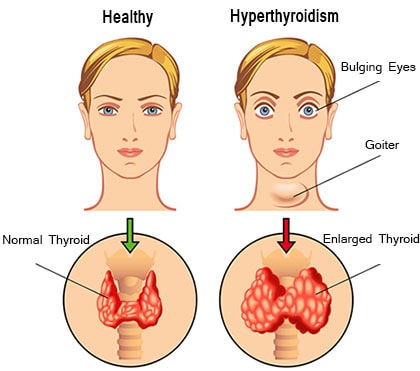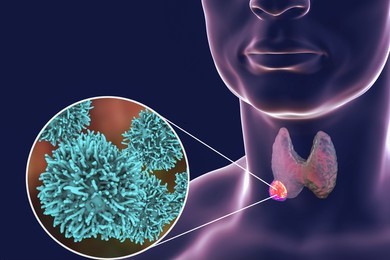Advancements In Thyroid Tumor Research: Promising Breakthroughs On The Horizon
Thyroid tumors have become an increasingly prevalent concern in the field of medicine, prompting a surge in research and technological advancements aimed at better understanding and treating these conditions. Recent years have witnessed significant breakthroughs that offer hope for improved diagnostics, targeted therapies, and ultimately better outcomes for patients facing thyroid tumors. This article delves into the latest advancements in thyroid tumor research, highlighting the promising breakthroughs on the horizon.
Understanding Thyroid Tumors
The thyroid, a small butterfly-shaped gland located in the neck, plays a crucial role in regulating various metabolic processes through the production of hormones. Thyroid tumors can manifest as nodules or growths in the thyroid tissue, with some being benign and others malignant. While thyroid cancer is relatively rare, its incidence has been steadily rising, necessitating comprehensive research efforts to enhance our understanding of the disease.
Genetic Insights
One of the most significant breakthroughs in thyroid tumor research is the unraveling of genetic factors contributing to the development of these tumors. Researchers have identified specific genetic mutations associated with thyroid cancer, shedding light on the molecular mechanisms that drive tumor formation. Understanding the genetic basis of thyroid tumors allows for more targeted and personalized treatment approaches, as well as the development of novel therapies aimed at interrupting the underlying genetic abnormalities.
Diagnostic Advances
Accurate and early diagnosis is crucial for effective thyroid tumor management. Recent advancements in diagnostic tools have enhanced our ability to detect thyroid nodules and differentiate between benign and malignant tumors. High-resolution ultrasound, molecular testing, and advanced imaging techniques, such as positron emission tomography (PET) scans, have revolutionized the diagnostic landscape. These tools enable healthcare professionals to assess the characteristics of thyroid nodules with greater precision, reducing unnecessary surgeries and improving overall patient care.
Precision Medicine in Treatment
The era of precision medicine has ushered in a new paradigm in the treatment of thyroid tumors. By tailoring therapeutic interventions to the specific genetic and molecular profile of each patient’s tumor, precision medicine holds the promise of more effective and targeted treatments. Targeted therapies, including tyrosine kinase inhibitors and immunotherapies, are showing encouraging results in clinical trials, offering hope for patients with advanced or resistant thyroid tumors.
Immunotherapy and Thyroid Tumors
Immunotherapy, a groundbreaking approach that harnesses the body’s immune system to target and destroy cancer cells, has emerged as a potential game-changer in thyroid tumor treatment. Clinical trials exploring the effectiveness of immune checkpoint inhibitors, such as pembrolizumab and nivolumab, have shown promising results in certain types of thyroid cancer. Immunotherapy not only offers an alternative for patients who may not respond well to traditional treatments but also opens avenues for combination therapies that enhance overall treatment efficacy.
Radioactive Iodine Therapy Advancements
Radioactive iodine therapy has been a mainstay in the treatment of thyroid cancer, particularly in cases where surgery alone may not be sufficient. Recent advancements in this therapy focus on refining dosage regimens and identifying patients who would benefit most from this approach. Research is ongoing to optimize the use of radioactive iodine, ensuring maximal therapeutic benefit while minimizing potential side effects, such as salivary gland damage and bone marrow suppression.
Liquid Biopsy for Monitoring
Monitoring the progression of thyroid tumors and assessing treatment response traditionally involves invasive procedures such as fine-needle aspiration (FNA) biopsies. However, the development of liquid biopsy techniques represents a less invasive and more dynamic approach to monitoring thyroid cancer. Liquid biopsies involve analyzing circulating tumor DNA in the blood, providing real-time information on the genetic changes occurring in the tumor. This approach holds great potential for more frequent and less burdensome monitoring of patients, enabling timely adjustments to treatment plans.
The Role of Artificial Intelligence
Artificial intelligence (AI) is making significant strides in various medical fields, and thyroid tumor research is no exception. AI algorithms are being trained to analyze medical imaging, pathology slides, and genetic data, aiding in the identification of subtle patterns indicative of thyroid cancer. This not only expedites the diagnostic process but also contributes to more accurate assessments, reducing the risk of misdiagnosis. The integration of AI into clinical decision-making holds the potential to enhance the overall efficiency and accuracy of thyroid tumor management.
International Collaborations
Advancements in thyroid tumor research are not confined to a single region or institution. International collaborations have become increasingly common, fostering the exchange of knowledge, expertise, and resources. Collaborative efforts allow researchers to pool data from diverse patient populations, leading to more comprehensive studies and a broader understanding of the genetic and environmental factors influencing thyroid tumor development. The synergy resulting from global cooperation accelerates the pace of discovery and the translation of research findings into clinical applications.
Patient-Centered Approaches
As research progresses, there is a growing emphasis on incorporating patient perspectives into the development of new treatments and therapies. Patient advocacy groups and support networks play a crucial role in raising awareness, promoting research funding, and influencing policy decisions. The integration of patient experiences and preferences into the research process ensures that advancements are not only scientifically robust but also aligned with the needs and priorities of those directly affected by thyroid tumors.
Conclusion
The landscape of thyroid tumor research is evolving rapidly, driven by remarkable breakthroughs that hold great promise for the future. From a deeper understanding of the genetic underpinnings of thyroid cancer to innovative diagnostic tools, targeted therapies, and the integration of artificial intelligence, the field is witnessing a transformative era. As research progresses, the collective efforts of scientists, healthcare professionals, and patient advocates will continue to shape a more nuanced and effective approach to the prevention, diagnosis, and treatment of thyroid tumors. The horizon is bright with the anticipation of further breakthroughs that will undoubtedly enhance the lives of individuals affected by thyroid cancer.








